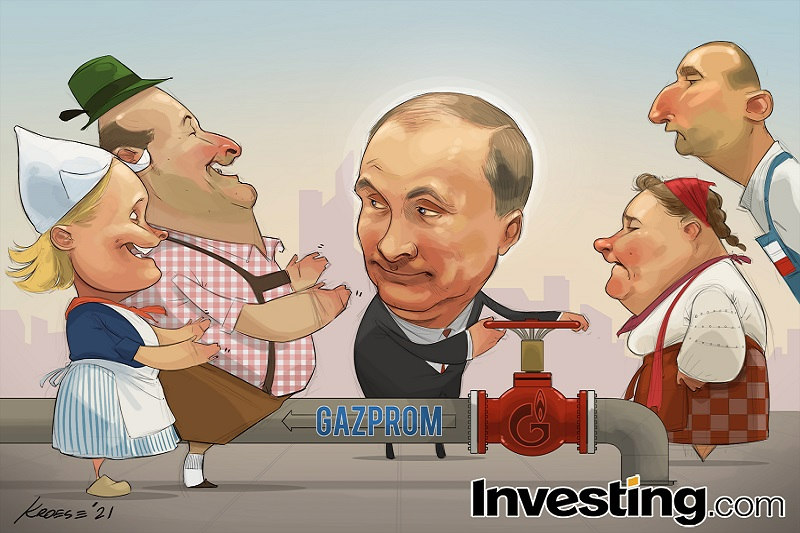By Geoffrey Smith
Investing.com -- An energy crisis is setting alarm bells ringing through Europe. Can Vladimir Putin turn them off? And if so, does he even want to?
Prices for both natural gas and the electricity it generates are going through the roof due to a combination of factors, threatening to choke off a fragile economic recovery by limiting energy supplies and draining consumers’ wallets.
Spot prices for power in the U.K. topped over 400 pounds ($552) per megawatt-hour on Monday, while October benchmark futures for natural gas on Germany’s EEX exchange have risen 50% since the start of August to a record 61.09 euros/MWh.
The causes of this drama are many: old fields in the U.K. North Sea have had long unplanned maintenance outages this year; Groningen, the Dutch field that is Europe’s largest, is being shut down for good due to earthquake risks; surging carbon prices have encouraged power generators to burn gas rather than coal at almost any price; industrial gas demand has been stronger than expected due to stimulus policies that have supported household consumption, while a cold spring kept households heating for longer than usual. To top it all, the U.K. has had an acute supply squeeze as unplanned nuclear outages coincided with a surprise drop in wind power availability.
For households in particular, it’s a nightmare scenario. Their energy bills are soaring just as governments start to wind down the employment support schemes that have kept them from being laid off for the last 18 months.
Across Europe, governments are starting to panic. On Monday, Spain’s Prime Minister Pedro Sanchez said he will cut 1.4 billion euros ($1.7 billion) in taxes on electricity bills and divert another 650 million euros of ‘excess’ profits from energy companies. Shares in the country’s two biggest utilities, Endesa (MC:ELE) and Iberdrola (OTC:IBDRY), fell 5.4% and 1.9%, respectively. Meanwhile, France’s Finance Minister hinted at expanding a credit for household energy bills that already costs some 800 million euros a year.
A perfect moment, you might think, for Russia to open the taps on its shiny new gas export project: the Nord Stream 2 pipeline, capable of carrying 55 billion cubic meters (1.93 trillion cubic feet) of gas a year direct from Russia to Germany under the Baltic Sea.
Gazprom (MCX:GAZP), the operator, said last week it has finally finished laying a pipeline that has been held up for years. It had said in August that it could ship 5.6 bcm already this year.
Things are unlikely to go that fast, however. Before it can start, the pipeline must first be tested for leaks and other safety issues. It must be certified by an internationally qualified company. Only then can it get definitive permission to operate from the Bundesnetzagentur, Germany’s infrastructure regulator.
That’s going to be tricky, because previous sanctions by the U.S. to stop Nord Stream 2 scared off all the likely candidates for doing and auditing that work, such as Baker Hughes and Norway’s DNV GL. A deal between outgoing German Chancellor Angela Merkel and U.S. President Joe Biden earlier this summer hasn’t fixed that legal problem.
Sensing that time is on their side, the Kremlin and Gazprom have been content to let the EU stew in its own juices. Shipments through the summer, when utilities typically fill up their gas storage, have been lower than usual, and the Europeans are skeptical of Russian claims that this, too, was due to purely technical outages. As a result, the continent is entering peak season with only 76 bcm of gas in storage, 18% below the five-year average, according to data compiled by Celsius Energy.
There will also be quiet (or not so quiet) amusement in Moscow as the U.S. - having pushed so hard to hook Europe on its LNG exports - finds itself unable to increase supplies just when Europe needs them most, due to Hurricane Nicholas disrupting the operations of terminals in Houston.
None of that automatically dooms Europe’s gas markets to a full winter of shortages and prices that force its factories to close. The winter may be milder than expected. U.K. fields are already ramping up again. The Bundesnetzagentur may offer a provisional permit for shipments if it feels Germany’s energy supply is endangered. In the medium term too, the International Energy Agency reckons that demand growth – will slow over the next three years and be easily covered by new export projects in the Middle East and, er, Russia.
But the current drama does highlight that Europe – as a massive net importer of energy – is now even more vulnerable than before to supply shocks as a result of a series of policy choices over the last decade: the accelerated phase-out of nuclear power in Germany, the clampdown on fossil fuels in new EU directives and, not least, aggressive antitrust actions against Gazprom in past years that have sorely tempted the Russian giant to give Europe a lesson in energy security. None of those challenges will disappear in the foreseeable future.
